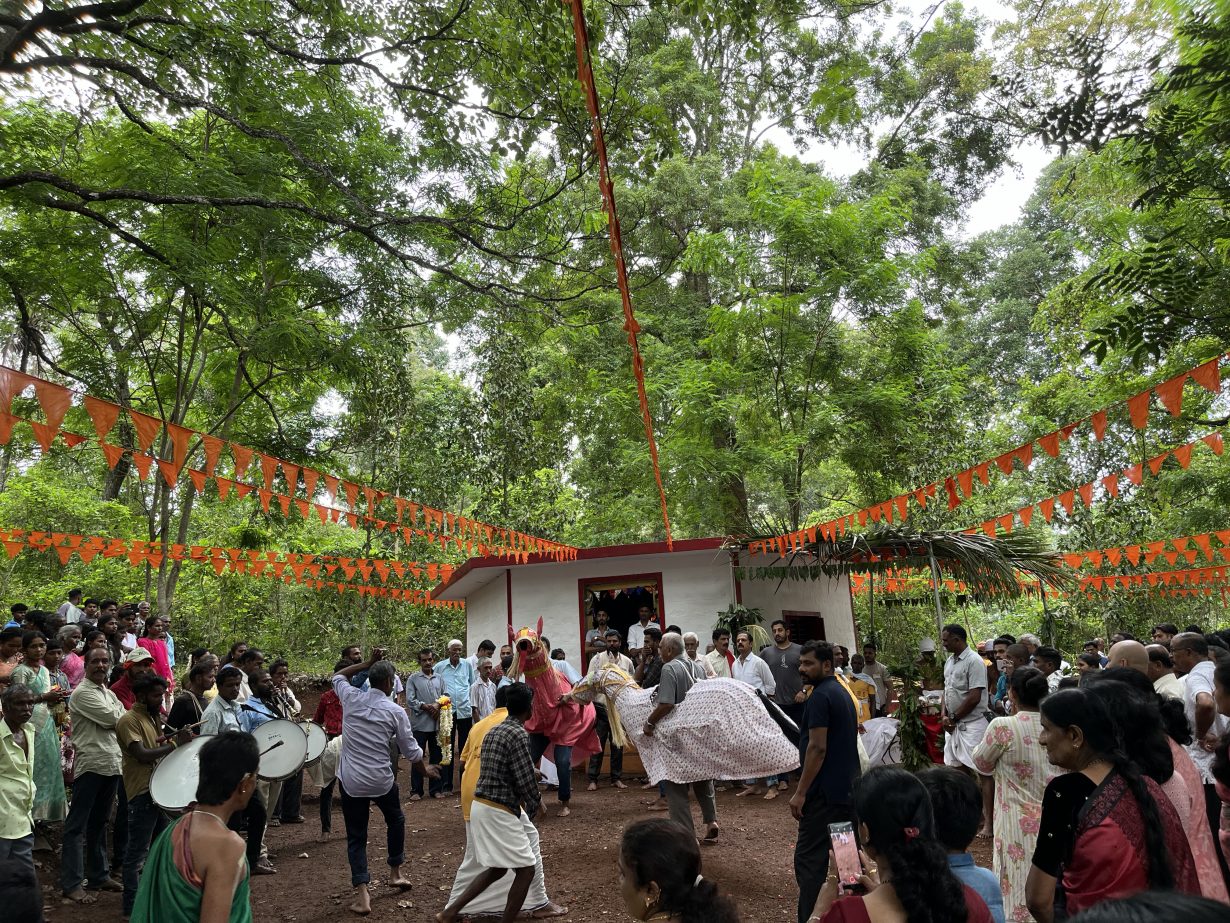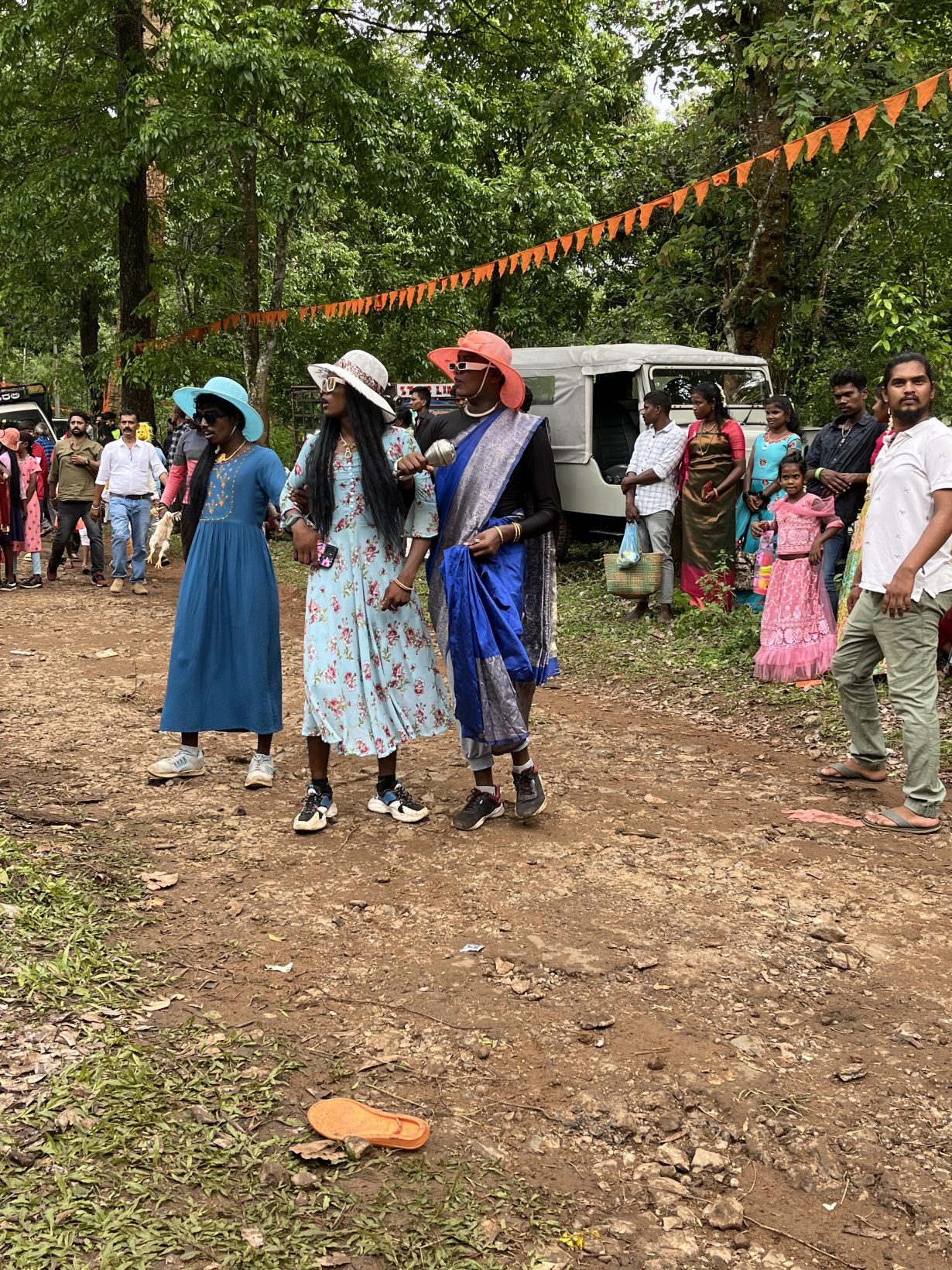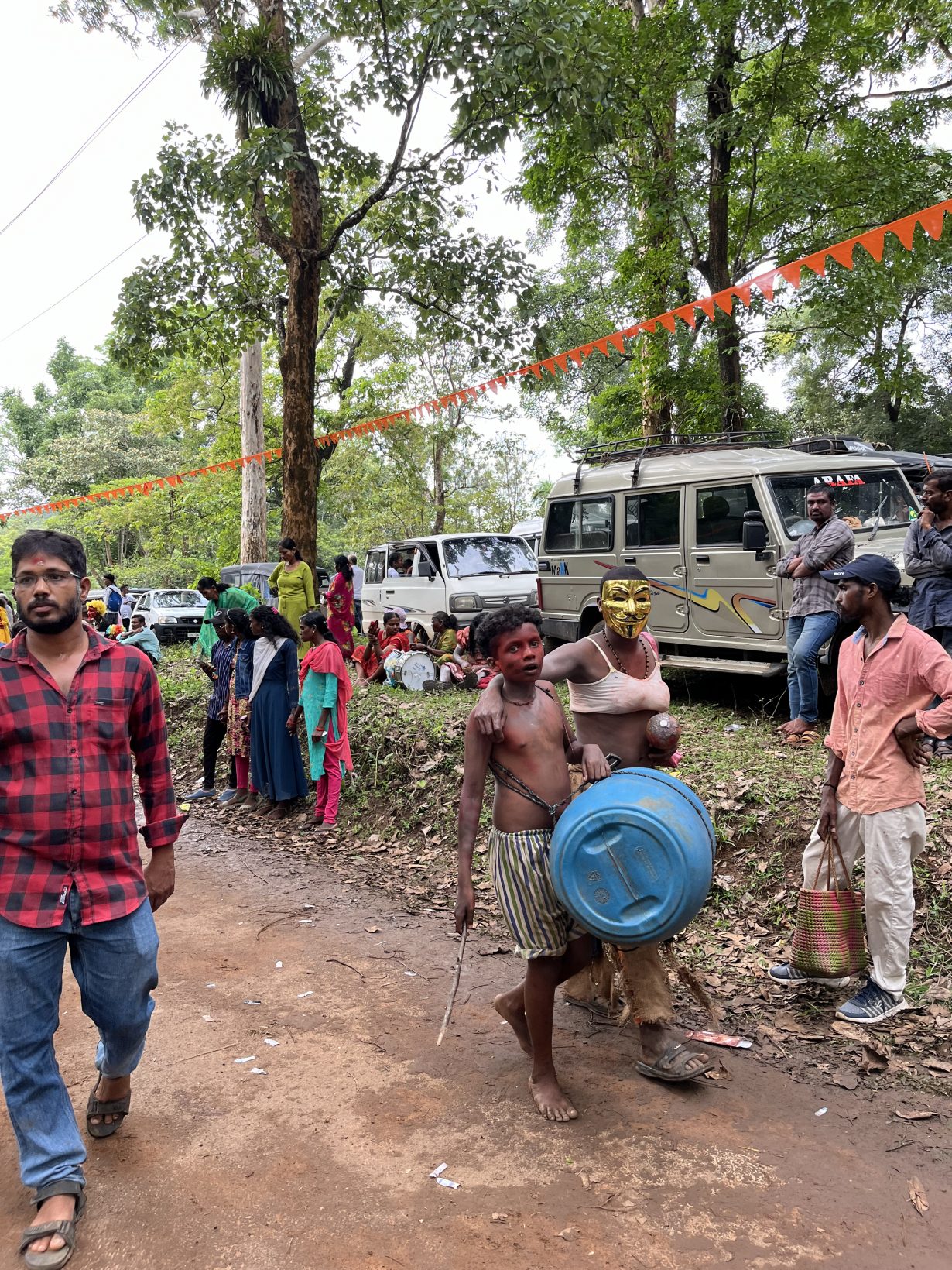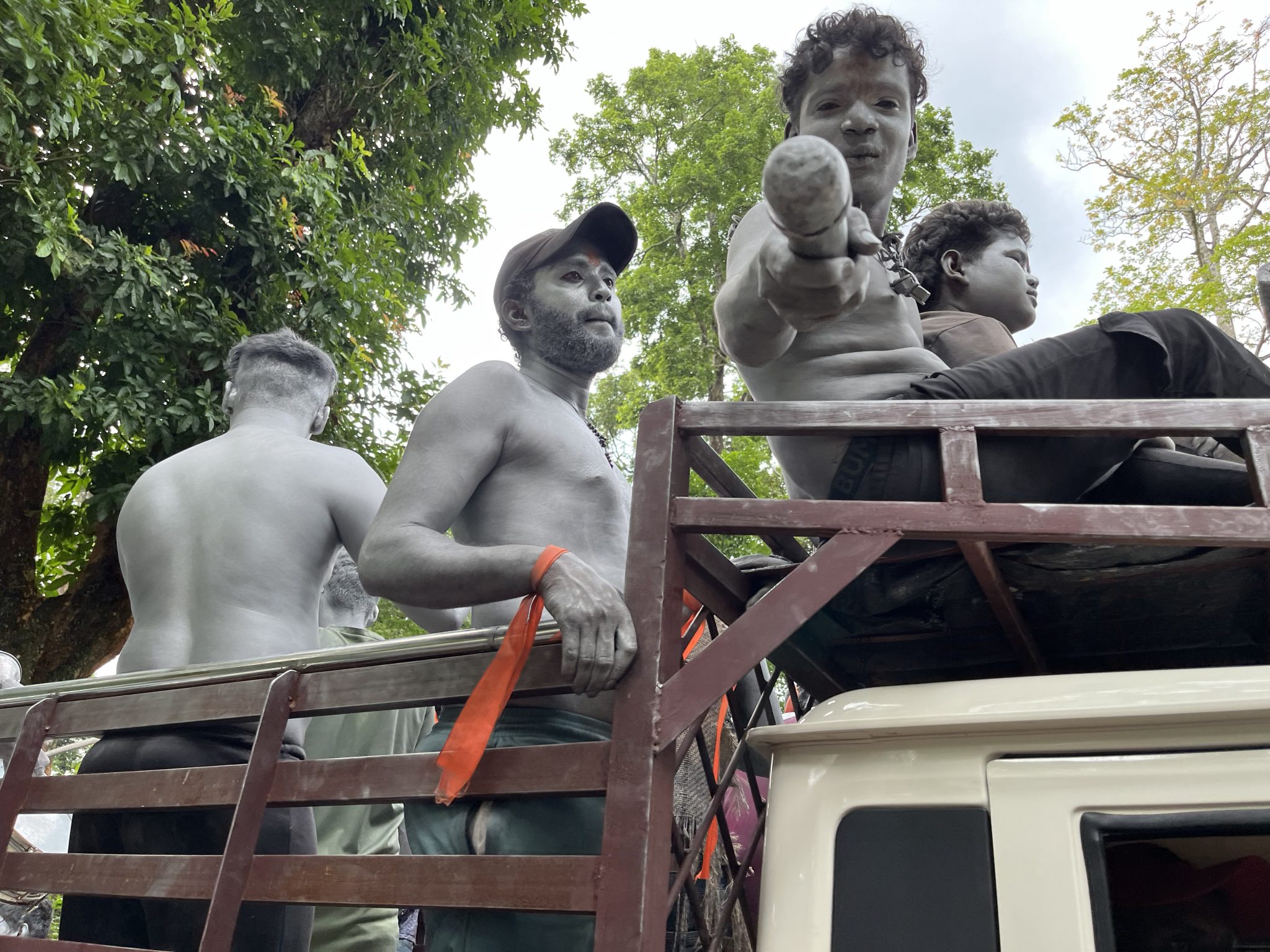The subversive Kunde Habba in rural Kodagu, India bears disturbing signs of the carnivalesque-grotesque
Monsoon in the Western Ghats in South India is a force, perhaps the single most important event in the economic and political calendar of a still largely agrarian country. The big wet winds usually make landfall in Kodagu district (where I live) by early June. Just before this, thousands of Indigenous peoples, or tribals, gather in villages in the interior of the region to hurl the choicest of abuses at their god and fellow community members. It is an act of subversive irreverence that, every summer, disrupts the mainstream Brahminical diktat of fear- and hierarchy-based worship of deities confined to temple monuments or stuck within shimmering photo frames. Unlike mainstream Hindu festivals, whose dates, decided by astrological charts, are wildly different each year, Kunde Habba (literally, ‘ass festival’) is observed on the fourth Thursday in May. It is also a perfect example of Mikhail Bakhtin’s carnivalesque-grotesque theory. According to Bakhtin, the carnival is a moment between the reality of life and art when displays of grotesqueness, excess, perhaps even violence, are not just permissible, but expected. In the Indian context, carnivalesque grotesque helps in the understanding of caste, power and the institutionalised oppression of some the poorest, most vulnerable communities in this coffee-growing region.
There are about two dozen different Indigenous peoples living in the southern parts of the district (and sharing community, gods and belief systems with tribes in the High Range region of neighbouring north Kerala). Legend is that Ayyappa, a forest deity of the Kurubas (the mountain-dwelling Betta-Kurubas, who harvest produce from the forest for a living, and Jenu Kurubas, honey gatherers, being two of the prominent subtribes), was on a mission in the forest with many tribespeople in tow when he became distracted by Bhagavathi, a forest goddess. His subsequent abandonment of the ancestors is remembered by the tribals when they curse him each year. The scolding as prayer is a dialogue with the god, for demands unmet, for negotiations and confessions, for letting off steam, no holds barred. It must help, too, to be able to vent frustrations and let loose on family, friends, neighbours and employers – these last nearly always wealthy coffee-plantation owners on whose lands the Indigenous peoples work for a daily wage, sometimes effectively as bonded labour – for one day of the year.


On the day of the festival, boys and men dress in drag and dance to bawdy lyrics that feature the refrain “kunde, kunde”, engaging in a mostly friendly exchange of abuses and rude gestures with other groups. Drums are made out of old tin-boxes or cut from broken blue storage-barrels. Silver-painted bodies are dressed in ingeniously repurposed gunny sacks or umbrella cloth, or in miniskirts, bralettes and long dresses borrowed from wives, sisters and daughters. Flowers are affixed to underwear; people wear bright face paint, slapdash makeup, a party wig, a Money Heist mask. In this transgression of the self, men, under a vow to the forest goddess, dress like women for a few hours. At Devarapura, a tiny village where celebrants congregate after collecting money from shopkeepers and passersby in nearby towns, the atmosphere is that of a carnival. The music is loud, the dancing is risqué and stunned chickens are sporadically thrown into the air as sacrifice. In the background, some elders fulfil the more ritualistic aspects of the festival, including a horse dance and mainstream acts of prayer with flowers, bells and chants. Elsewhere in the district smaller versions of the same festival are celebrated in prayer under trees, or to stones in shrines deep in the forest. Here in Devarapura there is a large, well-kept temple for Bhagavathi. As in any village fair, there are ice cream trucks, snack shops, cheap clothes for sale and plastic and soft toys for the children. Women participate as the audience. The performance of the festival is an all-male revelry.
By dismantling the unequal power equations between themselves and their gods, and between themselves and their employers, and by speaking across this divide in words and tones otherwise disallowed, the tribals access, however momentarily, a state of utopian freedom and social equality. The alternative world summoned by this pageantry is a humorous, creative and annually rejuvenating critique of the staid religious practices that mainstream Hindutva-forward systems prescribe, where god must be approached with fear, not friendship.

Bakhtin points out that while the carnivalesque is able to temporarily weaken feudalism and caste-based oppression, it does not have the political heft to overthrow such age-old practices. In fact, in contemporary India there are signs that Kunde Habba’s performance of subversive protest is being subsumed into dominant religious cultures. This was my first visit to the festival in nine years, and saffron buntings now fill the village (colour is intensely politicised in India: saffron for a radical version of Hindu, blue for the Dalits, green for Muslims). Local families of Kodavas, an Indigenous community that prefers to side with mainstream Hinduism while shying away from acknowledging the tribal nature of its cultural practices, seem to have a more visible role in the management of the festival and temple in Devarapura than in past years. Murmurs of complaint can be heard regarding the ‘unnecessary vulgarity’ of throwing abuses; the festival’s name has been sanitised as ‘Bedu Habba’, meaning ‘prayer, or asking festival’, in the media. Now, alongside the irreverence, hundreds of tribals pay to line up and offer special prayers at the temple; a priest as middleman presides.
In the story of Kunde Habba as it has come to be told today, Shiva and Parvati, prominent members of the Hindu mythological pantheon, have been made protagonists. This isn’t necessarily wrong: myths are not set locations in history, and must change constantly if they are to survive. However, considering that Indigenous peoples are routinely oppressed by policy, social conditioning and systemic violence in India and elsewhere, any such overt departure from a tribe-led festival for something more palatable, more commercial even, calls for scrutiny and critique.
Whether a new restraint in the grotesqueness of folk humour during the festival is the result of a country hurtling towards forced homogeneity in sociocultural practices or simply a natural progression of time that, thanks to political intervention, dilutes the purported problem of alterity and encourages assimilation, I cannot quite tell. Nonetheless, it is always a good idea to leave carnivals like Kunde Habba alone. They are among the last cultural sites that offer a strong counter to the upper caste and class that gatekeep religious and social relationships. A necessary reminder, in these years of majoritarianism, that alternatives are not just possible, but also available for proliferation.
Deepa Bhasthi is a writer based in Kodagu
